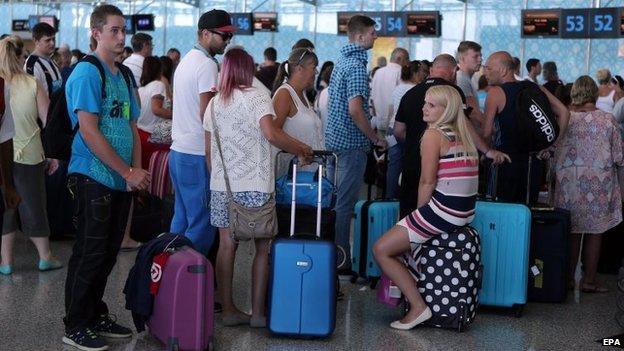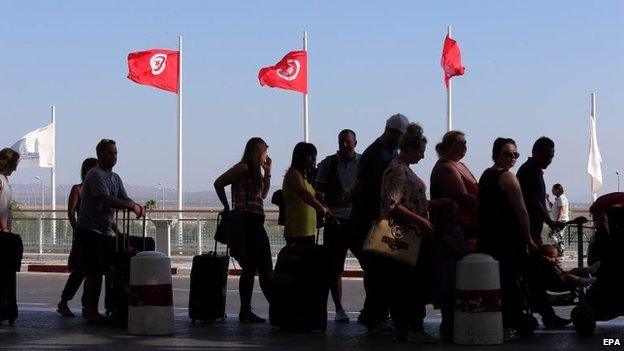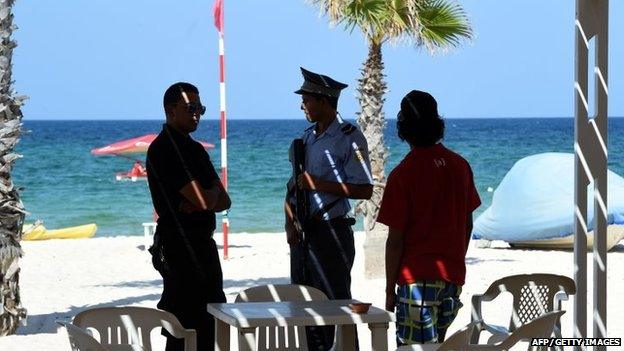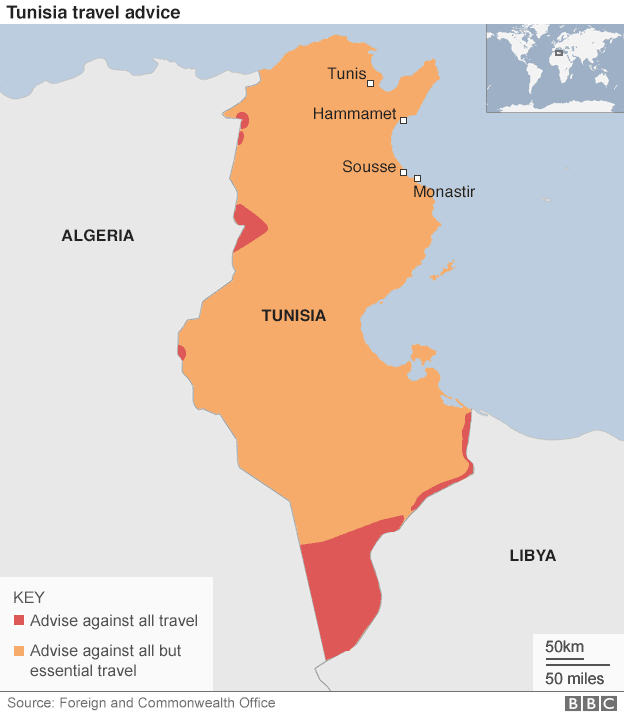Tunisia travel alert: Hundreds more Britons fly home
- Published
British tourist: "We didn't want to leave Tunisia early - we are being forced to"
More UK holidaymakers are flying home from Tunisia after the government advised them to leave the country amid fears of another terror attack.
Thomas Cook and Monarch Airlines expect to fly more than 2,000 people home over the weekend.
Tunisia declared a state of emergency after an Islamist gunman killed 38 people on a beach in Sousse on 26 June.
Tunisian Prime Minister Habib Essid said he "regretted" the UK government's decision but said "we understand".
He said the country had done everything it could to protect foreigners, with 100,000 security personnel being deployed to protect the country and prevent new attacks, including 3,000 dedicated to protecting beaches, hotels and archaeological sites.
The new travel advice, external has drawn much criticism from British tourists.
Tracey Caburn, from Pontefract in West Yorkshire, who returned from Tunisia with her mother and sister said: "It's a disgrace. We felt safe. We didn't feel threatened at all.
"There were guards on the roof, the gates, the beach. We wanted to stay. If they were going to bring us home so quickly they should not have let us fly out in the first place."

Hundreds of Britons are due to fly home on Saturday
'Ordered out'
Extra flights are being laid on across the weekend to evacuate thousands of British package holidaymakers and hundreds of independent travellers.
The Foreign Office estimates there are now between 1,000 and 2,000 Britons left in Tunisia. On Friday the figure stood at 3,000-3,500.
Thomas Cook and Monarch have cancelled all further bookings to Tunisia for the rest of the summer season.
Conservative MP Crispin Blunt, chairman of the Foreign Affairs Select Committee, which scrutinises the work of the Foreign Office, said the decision "raised questions".

There are five flights departing Enfidha Airport for the UK on Saturday
The BBC's Jim Muir, at Enfidha Airport, said many tourists felt the decision had been taken suddenly and was not justified.
"They're angry at the British authorities for suddenly springing this surprise two weeks after the attack on Sousse - and they're angry that their tour operators are taking this advisory as an instruction and practically ordering them out," he said.
Sara Southall, from Staffordshire, said the Foreign Office should have changed its travel advice sooner.
"If they were still investigating, I think they should have stopped everyone from travelling until they knew it was safe rather than sending us out here and then sending us back," she said.
"But obviously, if the decision's been made, I imagine there's a reason why, and I'd rather be safe."
Myles Roberts said: "[I'm] very, very disappointed. When I left England on Wednesday there were no problems whatsoever... It's been made quite clear to us that if we don't leave on these flights we could be stuck here until October."

Security was stepped in tourist areas in the wake of the attack
Mr Blunt questioned why travel advice was not changed immediately after the attack.
"What we don't know is the exact intelligence picture of what Philip Hammond (the foreign secretary) is seeing - but on the basis of what he's said it raises questions," he told BBC Radio 4's Today programme.
Mr Blunt said he intended to question Mr Hammond about the decision when he appears before the committee on 21 July.
Asked if he would be prepared to take his family on holiday to Tunisia, the former minister answered: "Yes."

The UK has warned another terror attack in the country was "highly likely".
Mr Hammond said it was "too big a risk" not to act but he hoped the guidance would be downgraded soon.
Ireland, where three of the victims were from, has warned against "all non-essential travel" to Tunisia, external. Denmark followed suit but Germany and France, which accounts for the largest number of tourists in the country, has not.
Former British ambassador to Libya Oliver Miles told the BBC he was "puzzled" at the decision to repatriate tourists.
"There clearly is a threat but what puzzles me is that the threat is not confined to Tunisia and is not confined to the British," he said.
The Sousse gunman has been identified as Seifeddine Rezgui, who authorities say had trained in Libya - but the Islamic State group claimed the attack.

Are you a British national in Tunisia? Are you following the FCO's travel advice? Send your comments to haveyoursay@bbc.co.uk, external.
If you are available to speak to a BBC journalist, please include a contact telephone number.
You can send your photos and videos to yourpics@bbc.co.uk, external or text them to 61124 (UK) or +44 7624 800 100 (international) number. Alternatively you can send pictures via our WhatsApp number +44 (0)7525 900971. Or you can upload here, external.